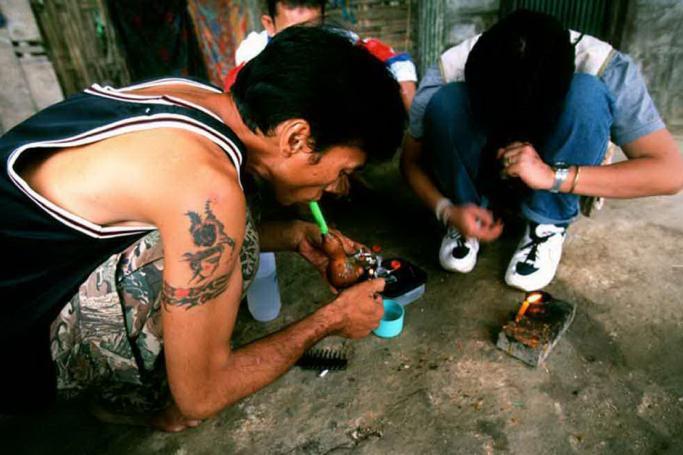Last week the Myanmar authorities used World Drug Day to torch half a billion dollars’ worth of illegal narcotics, yet the sad truth is that post-coup Myanmar is rife with easy-to-buy drugs.
Youth are the target for sellers with illegal drugs being easily bought in bars, nightclubs and karaoke venues.
Even young students can afford to buy them cheaply. Before the coup, it was difficult to obtain illegal drugs in these venues, and traffic police used to inspect those coming back from karaoke and nightclubs.
After the 2021 military coup, drug misuse is so common that plates and pipes are served right after entering famous bars and nightclubs.
Now the underlying message in Myanmar – despite the junta’s fiery destruction of seized drugs – is illicit stimulants are very easy to buy at cheap prices.
And the United Nations warns that production of methamphetamine in the region is hitting record levels.
Core questions surround this flood of narcotics post-coup including their ease of availability in entertainment venues run by military-owned businesses and speculation that the junta wants to distract the country’s youth at a time when considerable numbers are joining resistance groups.
Most of the officially licensed nightclubs and bars are owned by relatives of the junta’s military generals.
Compared to the previous civilian government, drugs spread widely at the lowest price in Myanmar after the military coup.
The sellers have a large market. Youths prefer freedom, having fun, and wanting to try new things.
Previously, the price of Yaba tablets containing a mixture of methamphetamine and caffeine, which is also known as WY, was 2,000 Kyat (about US$1) per tablet. However, at present, it can be bought for 500 Kyat to 1,000 Kyat per tablet, together with extra free tablets.
In the past, Ketamine, also known as ICE, had a price of 60,000 Kyat – 70,000 Kyat (between US$1,140 to 1,330) per kilogramme. It is now only around 30,000 Kyat (about US$573). These drugs and E or the Ecstasy drug, are widely used by youths. They are intoxicating drugs which now can be used openly in bars nightclubs.
Aung Kyaw, a journalist, who was released with amnesty after eight months of detention in Myeik Prison, talked about the involvement of military communities in the drug industry.
“I inquired of a ship captain who transported Ketamine (aka) ICE drug from Myeik, Tanintharyi Region to Malaysia using motorboats. He was just a carrier, and it took a week to transport ICE drugs from Myeik to Malaysia’s water territory. He said he earned a transport fee of 600 million Kyat (US$324,010) per time while the other five boatmen got over 15 million Kyat (about US$8,100) per time,” he said.
Such high levels of payment are attractive in times of economic hardship.
Aung Kyaw said he had heard that a military general from the army asked the person to transport the drugs.
“The source said the drugs were brought (to Myeik Port) by large cars owned by the military. They even gave the carrier's guns for security purposes. The carriers had to give back those guns to the relevant army officers when their mission was completed,” he said.
“The source said that the general (who asked the carrier to transport the drugs) stayed in Mandalay and had a private aircraft,” he added.
Analysts express concern about the burgeoning illegal drug trade and the negative effects this will have on youth in the midst of the Myanmar crisis.












